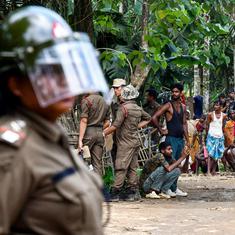To an office considered one of the country's strongest Lokayuktas, this is arguably the nadir in its existence since it was established in 1984. What is worse is that the turn of events over the last few days has exposed a fundamental problem: Who will probe or what action should be taken when the anti-corruption watchdog itself faces allegations of corruption? There are no clear answers.
Sequence of events
The timeline of events as they unfolded.
May 2015 An executive engineer of the state government orally informed the Superintendent of the Lokayukta police, Sonia Narang, that he had been summoned to the Lokayukta office premises where a man who claimed to be a joint commissioner threatened to “fix” him with a raid if he did not pay a ransom of Rs one crore. Sonia Narang informed her immediate superior, the Registrar and Additional Director General of Police, Lokayukta Prem Shankar Meena. According to officials, Sonia Narang, had also recieved such oral information from other government officials that they had received similar threat calls and claimed that they were asked to come to the Lokayukta Y Bhaskar Rao's official residence where they met his son Ashwin Rao.
June 23 One of the two Upa Lokayuktas, Subash B Adi, ordered Sonia Narang to investigate the allegations and submitted a report
June 26-28 In what has been alleged by activists "as a move to scuttle the probe ordered by the Upa Lokayukta", the Lokayukta issued a press release that IPS officer M Chandrasekar who heads the Central Crime Branch of the Bengaluru police would investigate the matter. This has become a matter of public embarassment as the officer's father-in-law is being investigated by the Lokayukta's office and the officer himself wrote back to the Lokayukta citing conflict of interest.
Unanswered questions
The manner in which the Lokayukta decided on a specific officer whose relative is under investigation has evoked sharp criticism. Questions were also raised about why the two Upa Lokyauktas were not consulted before such a decision was taken. Upa Lokayukta Subash B Adi has also publicly declared that he wanted a Central Bureau of Investigation inquiry into the matter.
Relenting to the embarrassment and pressure, the Lokayukta on June 28 wrote to the state government to order "any independent agency" to investigate the matter. Following this, on June 30, the state government ordered a Special Investigation team to look into the case.
In this backdrop, two important questions have been raised:
1. Can the state government or state police, which is constantly under the watch of the Lokayukta, perform an impartial and independent probe ?
2. What is the right course of action when the anti-corruption watch dog must be investigated?
Former Karnataka Lokayukta N Santosh Hegde, whose reports on illegal mining led to the end of the notorious mining mafia in the state in 2011, said that the state police and offices are constantly in a clash with the Lokayukta which investigates complaints against them. "...The CBI would be the only agency to turn to in this case," he said.
However, the Karnataka Lokayukta act does not have clarity on what should be done in a case like this one. In fact, even the Jan Lokpal Bill does not seem clear on the course of action that needs to be taken.
Special case
The case is so special because a matter as serious as this one has been left to the prerogative of the individual in charge of the Lokayukta. The High Court's intervention in the matter came after the Lokayukta's son Ashwin Rao moved the court. This by itself makes him a party to the dispute. A senior jurist, who requested anonymity, said the least the Lokayukta can do is to go on a leave of absence till the probe is completed.
The High Court itself has asked the Upa Lokayukta and the Lokayukta to wait till the Special Investigating Team submits its report, but will that be the right way to go forward?
It is time to write down in stone the procedures to follow when such a situation arises anywhere in the country.










